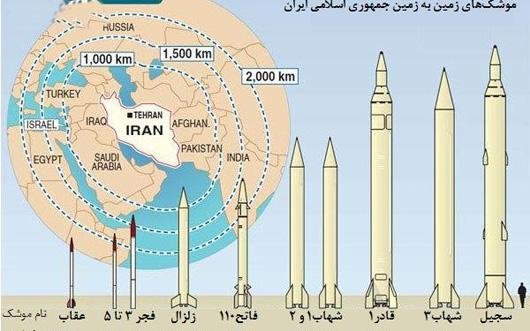Iran confirms missile launch, says it doesn’t breach UN resolution

TEHRAN – Iran confirmed on Wednesday it had carried out a fresh missile launch, saying the firing fits into its conventional defense doctrine and does not contravene the UN Security Council resolution that endorsed a 2015 nuclear deal with world powers.
“The recent test was in line with our [defense] program,” Defense Minister Hossein Dehqan was quoted as saying.
The comments come as the first formal reaction to a Fox News report that quoted two U.S. officials as having said that Iran had test-fired a failed ballistic medium-range missile on Sunday.
“Our missile tests do not conflict with BARJAM (Persian acronym for the nuclear deal) or (UNSC) Resolution 2231,” the minister said, adding Tehran will press ahead with its missile program.
The nuclear deal between Iran and six world powers resolved the nuclear dispute by removing sanctions against the country in exchange for it rolling back its nuclear program.
Days after the signing of the Joint Comprehensive Plan of Action, the official name for the nuclear accord, the Security Council ratified Resolution 2231 to endorse the deal.
It calls upon Iran “not to undertake any activity related to ballistic missiles designed to be capable of delivering nuclear weapons, including launches using such ballistic missile technology,” until eight years after the implementation of the deal.
Washington called on the Security Council to look into the missile launch, arguing that it violated the resolution.
The UN Security Council met on Tuesday at the Trump administration's request after U.S. ambassador to international body called the test “unacceptable.”
The emergency meeting, however, did not come up with any specific decision, recommending it be studied at committee level, Reuters quoted British UN ambassador Matthew Rycroft as saying.
The missile launch comes as the first one since President Trump took office.
During the campaign, Trump often condemned the nuclear deal and at times conflated Iran’s nuclear program and its missile program.
Condemning the launch on Monday, Senator Bob Corker, chairman of the U.S. Senate Foreign Relations Committee, said he would work with other lawmakers and the Trump administration to hold Iran accountable.
In a joint press conference with his French opposite number Jean-Marc Ayrault on Tuesday in Tehran, Iranian Foreign Minister Mohammad Javad Zarif hoped Tehran’s defensive program would not act as a “pretext” for the new U.S. administration.
Neither confirming nor denying the missile test report, Zarif underscored that his country’s missiles are conventional and not capable of carrying warheads.
Iran uses its “conventional” missiles to “legitimately” defend its territory, the top Iranian diplomat maintained.
Also, Ali Shamkhani, secretary of the powerful Supreme National Security Council and former defense minister, ruled out any international effort to limit the country’s missile capability.
“We will not take permission from any country or international organization to boost our conventional defense capability,” he said during a meeting with Armenian Defense Minister Vigen Sargsyan on Wednesday.
Reactions from Europe
The missile launch has been met with mixed reactions from Europe.
In the joint press meeting with Zarif in Tehran, French Foreign Minister Ayrault said he had voiced concerns over the testing, seeing it in defiance of Resolution 2231.
London also expressed concerns.
"On Iran, there was very significant concern about the ballistic missile launch which has now been confirmed," Reuters quoted British UN ambassador Matthew Rycroft as saying.
Similarly, Germany saw the test “case for serious concern” and “incompatible with UN Security Council resolution 2231,” its foreign ministry said.
Also, EU foreign policy spokeswoman Nabila Massrali said a ballistic missile test would not violate the nuclear deal with world powers, but added that it was "inconsistent" with Resolution 2231.
However, "Whether it constitutes a violation is for the Security Council to determine," she said.
In an exception to the pattern, Russia rejected that the ballistic missile test violated the resolution.
“Such actions, if they took place, do not breach the resolution,” Russian Deputy Foreign Minister Sergei Ryabkov told Interfax news agency, saying demands for UN talks were aimed at “heating up the situation”.
China has not commented on the issue yet.
Iran missile program, and unjustified concerns
Over the past few years, Iran’s missile program has been time and again discussed by certain Western countries and their Middle East allies.
Opponents cite what they call “concerns” over the arcana of the program, and have attempted to carve out a provocative, destabilizing image of Iran via their propaganda machines.
Zalmay Khalilzad, former U.S. Ambassador to Afghanistan, Iraq, and the United Nations, asserts that Iran’s missile program should “rank among the highest priorities of U.S. national security concerns.”
He goes on to give Iran’s increasing missile capability a strategic direction, and looks at it as a key element of the country’s long-term ambitions for “regional hegemony.”
Iran, on the other hand, has rejected the views, saying its missile program is purely defensive as part of a “strategic policy.”
"We will pursue any measure to boost our defense might and this is a strategic policy," President Hassan Rouhani, a moderate, said in March 2016.
"But at the same time we should remain vigilant so that Iran's enemies do not find any excuse to take advantage of the situation,” he further said.
In comments posted on his twitter on March 15, 2016, Zarif said if Iran had missiles, former Iraqi dictator Saddam Hussein may not have invaded the nascent Islamic Republic in 1980.
“If we had missiles during Saddam’s war on us, they may have discouraged or at least reduced his indiscriminate attacks on our civilians.”
“Iran hasn't attacked any country in 250 years. But when Saddam rained missiles on us and gassed our people for 8 yrs., no one helped us.”
AK/PA
Leave a Comment